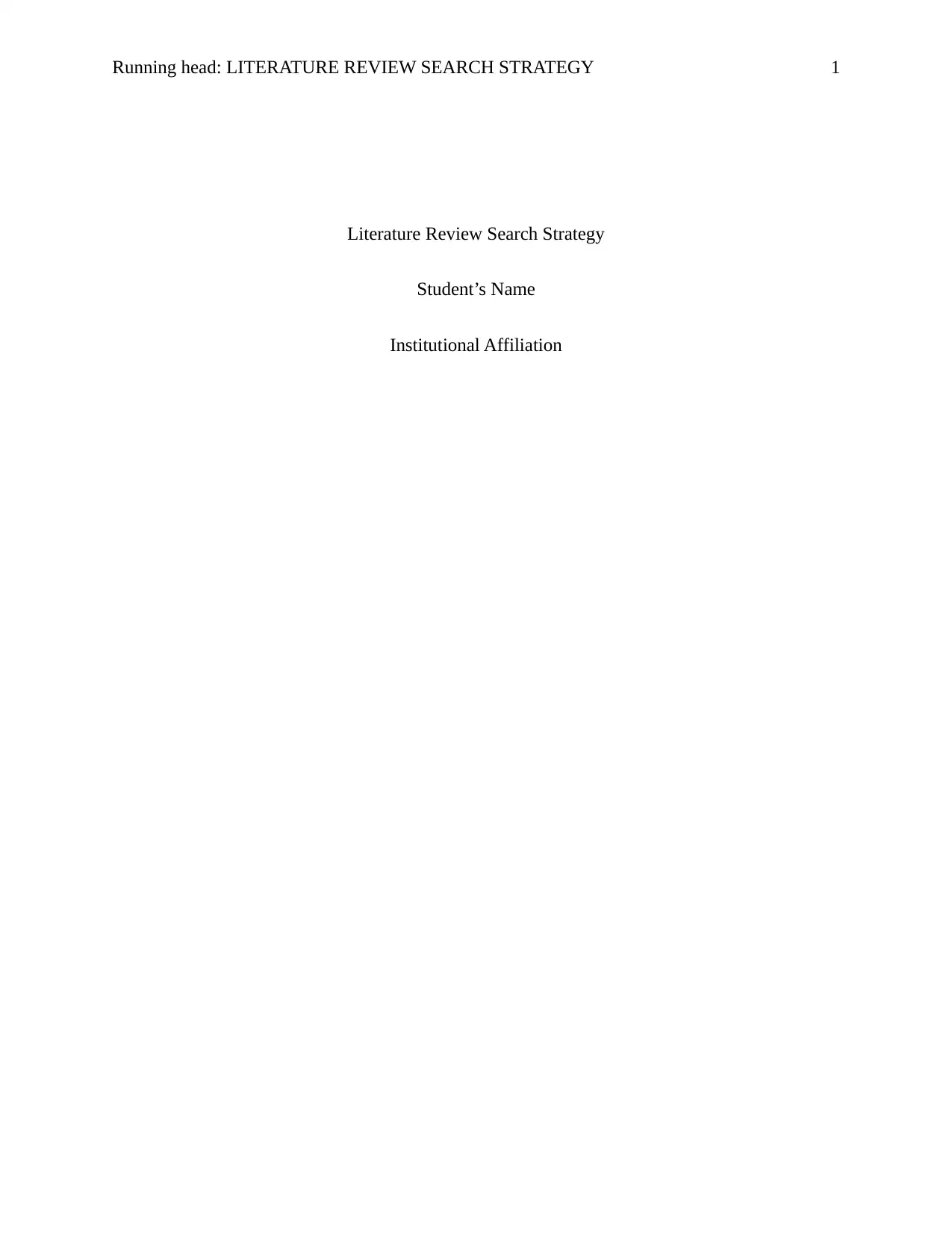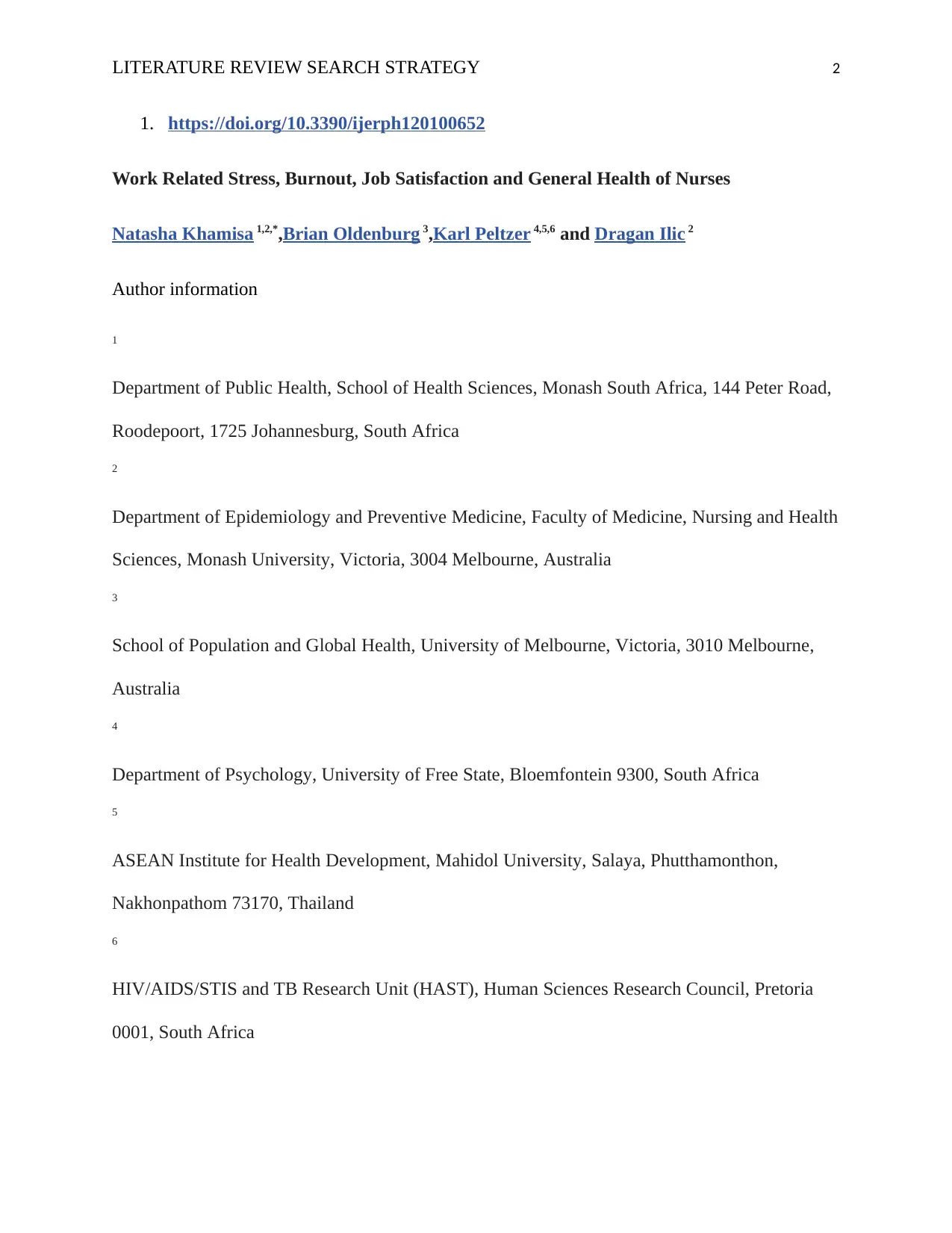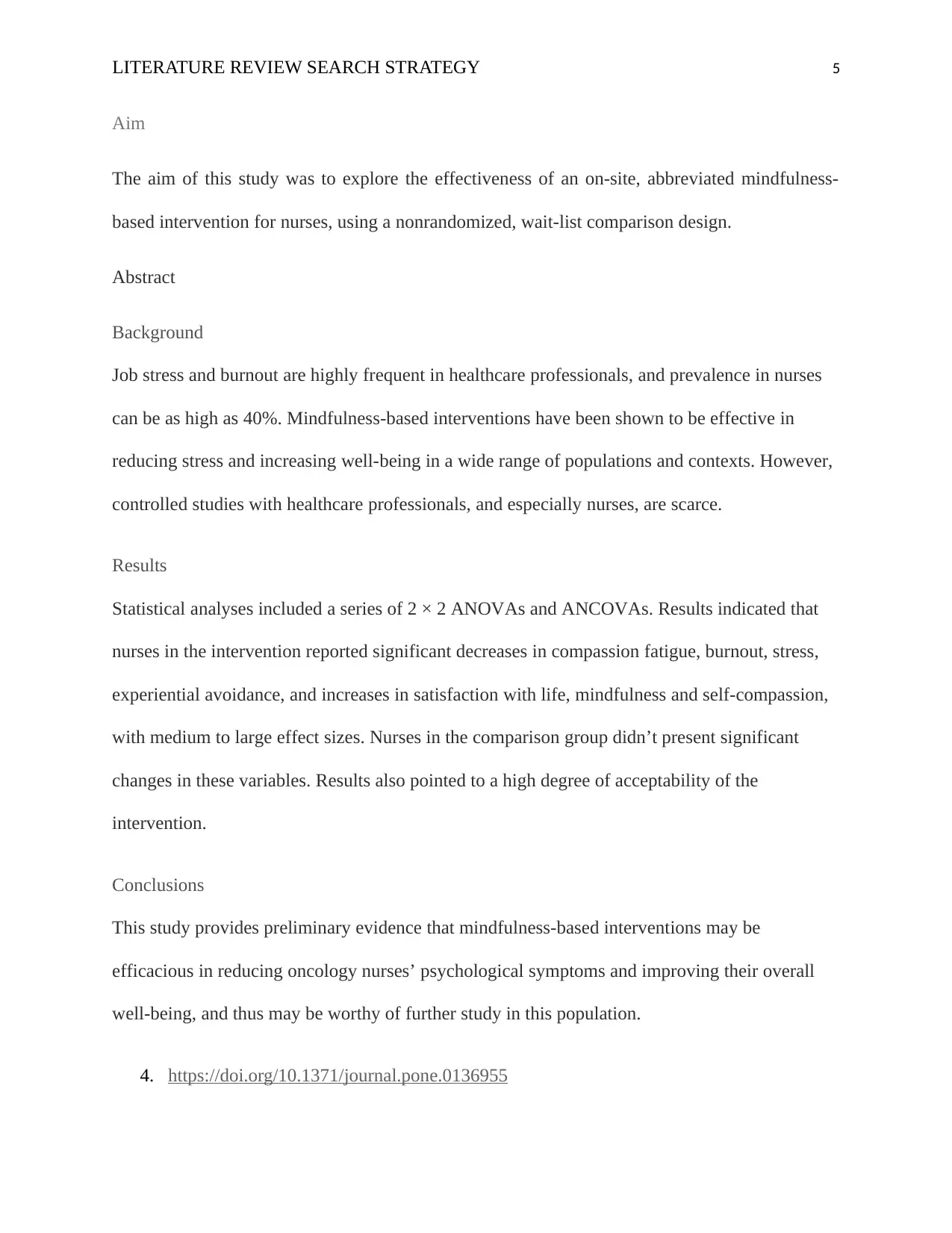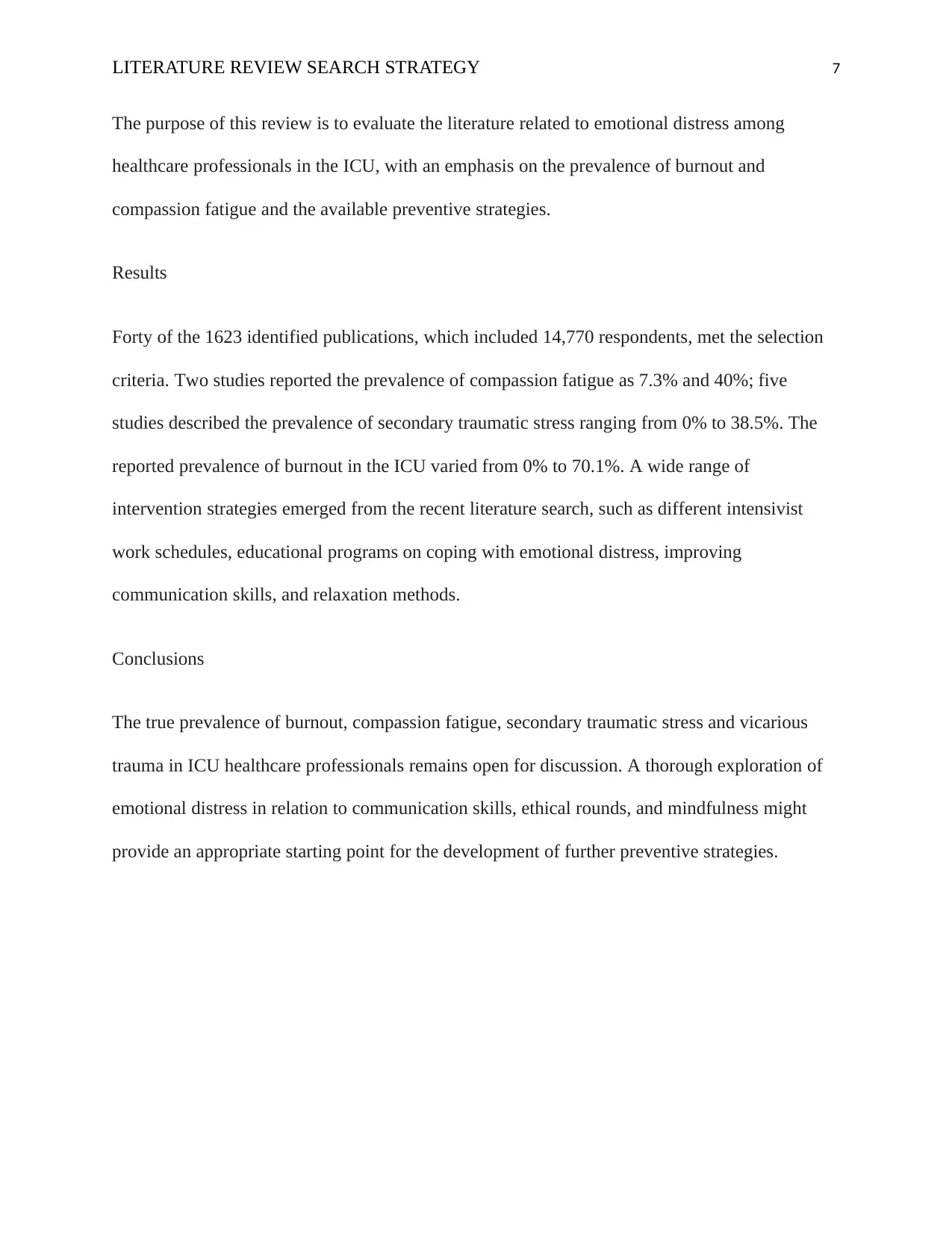Literature Review: Workplace Stress and Nurse Outcomes
VerifiedAdded on 2022/10/01
|7
|1204
|15
Literature Review
AI Summary
This literature review synthesizes research on nurse burnout, compassion fatigue, and related factors such as workplace stress, job satisfaction, and general health. The review examines studies conducted in various healthcare settings, including hospitals and intensive care units, highlighting the prevalence of these issues and their impact on nurses' mental and physical wellbeing. Several studies explore the effectiveness of interventions, such as mindfulness-based programs, in reducing burnout symptoms and improving overall outcomes. The review also discusses the importance of addressing issues like security risks and staff shortages in the workplace. Furthermore, the review references multiple articles and studies with a focus on the causes and consequences of burnout, as well as potential strategies for prevention and intervention, emphasizing the need for further research to develop effective solutions to support nurses and improve patient care. The literature review also includes a summary of the factors that influence the use of contraception among African women.

Running head: LITERATURE REVIEW SEARCH STRATEGY 1
Literature Review Search Strategy
Student’s Name
Institutional Affiliation
Literature Review Search Strategy
Student’s Name
Institutional Affiliation
Paraphrase This Document
Need a fresh take? Get an instant paraphrase of this document with our AI Paraphraser

LITERATURE REVIEW SEARCH STRATEGY 2
1. https://doi.org/10.3390/ijerph120100652
Work Related Stress, Burnout, Job Satisfaction and General Health of Nurses
Natasha Khamisa 1,2,*,Brian Oldenburg 3,Karl Peltzer 4,5,6 and Dragan Ilic 2
Author information
1
Department of Public Health, School of Health Sciences, Monash South Africa, 144 Peter Road,
Roodepoort, 1725 Johannesburg, South Africa
2
Department of Epidemiology and Preventive Medicine, Faculty of Medicine, Nursing and Health
Sciences, Monash University, Victoria, 3004 Melbourne, Australia
3
School of Population and Global Health, University of Melbourne, Victoria, 3010 Melbourne,
Australia
4
Department of Psychology, University of Free State, Bloemfontein 9300, South Africa
5
ASEAN Institute for Health Development, Mahidol University, Salaya, Phutthamonthon,
Nakhonpathom 73170, Thailand
6
HIV/AIDS/STIS and TB Research Unit (HAST), Human Sciences Research Council, Pretoria
0001, South Africa
1. https://doi.org/10.3390/ijerph120100652
Work Related Stress, Burnout, Job Satisfaction and General Health of Nurses
Natasha Khamisa 1,2,*,Brian Oldenburg 3,Karl Peltzer 4,5,6 and Dragan Ilic 2
Author information
1
Department of Public Health, School of Health Sciences, Monash South Africa, 144 Peter Road,
Roodepoort, 1725 Johannesburg, South Africa
2
Department of Epidemiology and Preventive Medicine, Faculty of Medicine, Nursing and Health
Sciences, Monash University, Victoria, 3004 Melbourne, Australia
3
School of Population and Global Health, University of Melbourne, Victoria, 3010 Melbourne,
Australia
4
Department of Psychology, University of Free State, Bloemfontein 9300, South Africa
5
ASEAN Institute for Health Development, Mahidol University, Salaya, Phutthamonthon,
Nakhonpathom 73170, Thailand
6
HIV/AIDS/STIS and TB Research Unit (HAST), Human Sciences Research Council, Pretoria
0001, South Africa

LITERATURE REVIEW SEARCH STRATEGY 3
Abstract
Gaps in research focusing on work related stress, burnout, job satisfaction and general health of
nurses is evident within developing contexts like South Africa. This study identified the
relationship between work related stress, burnout, job satisfaction and general health of nurses. A
total of 1200 nurses from four hospitals were invited to participate in this cross-sectional study
(75% response rate). Participants completed five questionnaires and multiple linear regression
analysis was used to determine significant relationships between variables. Staff issues are best
associated with burnout as well as job satisfaction. Burnout explained the highest amount of
variance in mental health of nurses. These are known to compromise productivity and
performance, as well as affect the quality of patient care. Issues, such as security risks in the
workplace, affect job satisfaction and health of nurses. Although this is more salient to
developing contexts it is important in developing strategies and intervention programs towards
improving nurse and patient related outcomes.
2. https://doi.org/10.1002/wps.20311
Understanding the burnout experience: recent research and its implications for psychiatry
Christina Maslach Michael P. Leiter
Abstract
Abstract
Gaps in research focusing on work related stress, burnout, job satisfaction and general health of
nurses is evident within developing contexts like South Africa. This study identified the
relationship between work related stress, burnout, job satisfaction and general health of nurses. A
total of 1200 nurses from four hospitals were invited to participate in this cross-sectional study
(75% response rate). Participants completed five questionnaires and multiple linear regression
analysis was used to determine significant relationships between variables. Staff issues are best
associated with burnout as well as job satisfaction. Burnout explained the highest amount of
variance in mental health of nurses. These are known to compromise productivity and
performance, as well as affect the quality of patient care. Issues, such as security risks in the
workplace, affect job satisfaction and health of nurses. Although this is more salient to
developing contexts it is important in developing strategies and intervention programs towards
improving nurse and patient related outcomes.
2. https://doi.org/10.1002/wps.20311
Understanding the burnout experience: recent research and its implications for psychiatry
Christina Maslach Michael P. Leiter
Abstract
⊘ This is a preview!⊘
Do you want full access?
Subscribe today to unlock all pages.

Trusted by 1+ million students worldwide

LITERATURE REVIEW SEARCH STRATEGY 4
The experience of burnout has been the focus of much research during the past few decades.
Measures have been developed, as have various theoretical models, and research studies from
many countries have contributed to a better understanding of the causes and consequences of this
occupationally‐specific dysphoria. The majority of this work has focused on human service
occupations, and particularly health care. Research on the burnout experience for psychiatrists
mirrors much of the broader literature, in terms of both sources and outcomes of burnout. But it
has also identified some of the unique stressors that mental health professionals face when they
are dealing with especially difficult or violent clients. Current issues of particular relevance for
psychiatry include the links between burnout and mental illness, the attempts to redefine burnout
as simply exhaustion, and the relative dearth of evaluative research on potential interventions to
treat and/or prevent burnout. Given that the treatment goal for burnout is usually to enable people
to return to their job, and to be successful in their work, psychiatry could make an important
contribution by identifying the treatment strategies that would be most effective in achieving that
goal.
3. https://doi.org/10.1016/j.ijnurstu.2016.10.002
Effectiveness of a mindfulness-based intervention on oncology nurses’ burnout and compassion
fatigue symptoms: A non-randomized study
Joana Duarte. José Pinto-Gouveia
Author information
Cognitive–Behavioural Centre for Research and Intervention (CINEICC), University of
Coimbra, Portugal
The experience of burnout has been the focus of much research during the past few decades.
Measures have been developed, as have various theoretical models, and research studies from
many countries have contributed to a better understanding of the causes and consequences of this
occupationally‐specific dysphoria. The majority of this work has focused on human service
occupations, and particularly health care. Research on the burnout experience for psychiatrists
mirrors much of the broader literature, in terms of both sources and outcomes of burnout. But it
has also identified some of the unique stressors that mental health professionals face when they
are dealing with especially difficult or violent clients. Current issues of particular relevance for
psychiatry include the links between burnout and mental illness, the attempts to redefine burnout
as simply exhaustion, and the relative dearth of evaluative research on potential interventions to
treat and/or prevent burnout. Given that the treatment goal for burnout is usually to enable people
to return to their job, and to be successful in their work, psychiatry could make an important
contribution by identifying the treatment strategies that would be most effective in achieving that
goal.
3. https://doi.org/10.1016/j.ijnurstu.2016.10.002
Effectiveness of a mindfulness-based intervention on oncology nurses’ burnout and compassion
fatigue symptoms: A non-randomized study
Joana Duarte. José Pinto-Gouveia
Author information
Cognitive–Behavioural Centre for Research and Intervention (CINEICC), University of
Coimbra, Portugal
Paraphrase This Document
Need a fresh take? Get an instant paraphrase of this document with our AI Paraphraser

LITERATURE REVIEW SEARCH STRATEGY 5
Aim
The aim of this study was to explore the effectiveness of an on-site, abbreviated mindfulness-
based intervention for nurses, using a nonrandomized, wait-list comparison design.
Abstract
Background
Job stress and burnout are highly frequent in healthcare professionals, and prevalence in nurses
can be as high as 40%. Mindfulness-based interventions have been shown to be effective in
reducing stress and increasing well-being in a wide range of populations and contexts. However,
controlled studies with healthcare professionals, and especially nurses, are scarce.
Results
Statistical analyses included a series of 2 × 2 ANOVAs and ANCOVAs. Results indicated that
nurses in the intervention reported significant decreases in compassion fatigue, burnout, stress,
experiential avoidance, and increases in satisfaction with life, mindfulness and self-compassion,
with medium to large effect sizes. Nurses in the comparison group didn’t present significant
changes in these variables. Results also pointed to a high degree of acceptability of the
intervention.
Conclusions
This study provides preliminary evidence that mindfulness-based interventions may be
efficacious in reducing oncology nurses’ psychological symptoms and improving their overall
well-being, and thus may be worthy of further study in this population.
4. https://doi.org/10.1371/journal.pone.0136955
Aim
The aim of this study was to explore the effectiveness of an on-site, abbreviated mindfulness-
based intervention for nurses, using a nonrandomized, wait-list comparison design.
Abstract
Background
Job stress and burnout are highly frequent in healthcare professionals, and prevalence in nurses
can be as high as 40%. Mindfulness-based interventions have been shown to be effective in
reducing stress and increasing well-being in a wide range of populations and contexts. However,
controlled studies with healthcare professionals, and especially nurses, are scarce.
Results
Statistical analyses included a series of 2 × 2 ANOVAs and ANCOVAs. Results indicated that
nurses in the intervention reported significant decreases in compassion fatigue, burnout, stress,
experiential avoidance, and increases in satisfaction with life, mindfulness and self-compassion,
with medium to large effect sizes. Nurses in the comparison group didn’t present significant
changes in these variables. Results also pointed to a high degree of acceptability of the
intervention.
Conclusions
This study provides preliminary evidence that mindfulness-based interventions may be
efficacious in reducing oncology nurses’ psychological symptoms and improving their overall
well-being, and thus may be worthy of further study in this population.
4. https://doi.org/10.1371/journal.pone.0136955

LITERATURE REVIEW SEARCH STRATEGY 6
The Prevalence of Compassion Fatigue and Burnout among Healthcare Professionals in
Intensive Care Units: A Systematic Review
Margo M. C. van Mol , Erwin J. O. Kompanje, Dominique D. Benoit, Jan Bakker, Marjan D.
Nijkamp
Author information
Faculty of pyschlogy and educational science, open university of the Netherlands, Heelen,
Netherlands
Deooartment of intensive care adults, Erasmus MC University Medical Center
Department of intensive care unit, Medical Unit Ghent University Hospital, Ghent, Belgium
Department of Intensive Care Adults, Erasmus Mc University Medical center, Rotterdam. The
Netherlends
Abstract
Background
Working in the stressful environment of the Intensive Care Unit (ICU) is an emotionally charged
challenge that might affect the emotional stability of medical staff. The quality of care for ICU
patients and their relatives might be threatened through long-term absenteeism or a brain and
skill drain if the healthcare professionals leave their jobs prematurely in order to preserve their
own health.
Aim
The Prevalence of Compassion Fatigue and Burnout among Healthcare Professionals in
Intensive Care Units: A Systematic Review
Margo M. C. van Mol , Erwin J. O. Kompanje, Dominique D. Benoit, Jan Bakker, Marjan D.
Nijkamp
Author information
Faculty of pyschlogy and educational science, open university of the Netherlands, Heelen,
Netherlands
Deooartment of intensive care adults, Erasmus MC University Medical Center
Department of intensive care unit, Medical Unit Ghent University Hospital, Ghent, Belgium
Department of Intensive Care Adults, Erasmus Mc University Medical center, Rotterdam. The
Netherlends
Abstract
Background
Working in the stressful environment of the Intensive Care Unit (ICU) is an emotionally charged
challenge that might affect the emotional stability of medical staff. The quality of care for ICU
patients and their relatives might be threatened through long-term absenteeism or a brain and
skill drain if the healthcare professionals leave their jobs prematurely in order to preserve their
own health.
Aim
⊘ This is a preview!⊘
Do you want full access?
Subscribe today to unlock all pages.

Trusted by 1+ million students worldwide

LITERATURE REVIEW SEARCH STRATEGY 7
The purpose of this review is to evaluate the literature related to emotional distress among
healthcare professionals in the ICU, with an emphasis on the prevalence of burnout and
compassion fatigue and the available preventive strategies.
Results
Forty of the 1623 identified publications, which included 14,770 respondents, met the selection
criteria. Two studies reported the prevalence of compassion fatigue as 7.3% and 40%; five
studies described the prevalence of secondary traumatic stress ranging from 0% to 38.5%. The
reported prevalence of burnout in the ICU varied from 0% to 70.1%. A wide range of
intervention strategies emerged from the recent literature search, such as different intensivist
work schedules, educational programs on coping with emotional distress, improving
communication skills, and relaxation methods.
Conclusions
The true prevalence of burnout, compassion fatigue, secondary traumatic stress and vicarious
trauma in ICU healthcare professionals remains open for discussion. A thorough exploration of
emotional distress in relation to communication skills, ethical rounds, and mindfulness might
provide an appropriate starting point for the development of further preventive strategies.
The purpose of this review is to evaluate the literature related to emotional distress among
healthcare professionals in the ICU, with an emphasis on the prevalence of burnout and
compassion fatigue and the available preventive strategies.
Results
Forty of the 1623 identified publications, which included 14,770 respondents, met the selection
criteria. Two studies reported the prevalence of compassion fatigue as 7.3% and 40%; five
studies described the prevalence of secondary traumatic stress ranging from 0% to 38.5%. The
reported prevalence of burnout in the ICU varied from 0% to 70.1%. A wide range of
intervention strategies emerged from the recent literature search, such as different intensivist
work schedules, educational programs on coping with emotional distress, improving
communication skills, and relaxation methods.
Conclusions
The true prevalence of burnout, compassion fatigue, secondary traumatic stress and vicarious
trauma in ICU healthcare professionals remains open for discussion. A thorough exploration of
emotional distress in relation to communication skills, ethical rounds, and mindfulness might
provide an appropriate starting point for the development of further preventive strategies.
1 out of 7
Related Documents
Your All-in-One AI-Powered Toolkit for Academic Success.
+13062052269
info@desklib.com
Available 24*7 on WhatsApp / Email
![[object Object]](/_next/static/media/star-bottom.7253800d.svg)
Unlock your academic potential
Copyright © 2020–2026 A2Z Services. All Rights Reserved. Developed and managed by ZUCOL.





